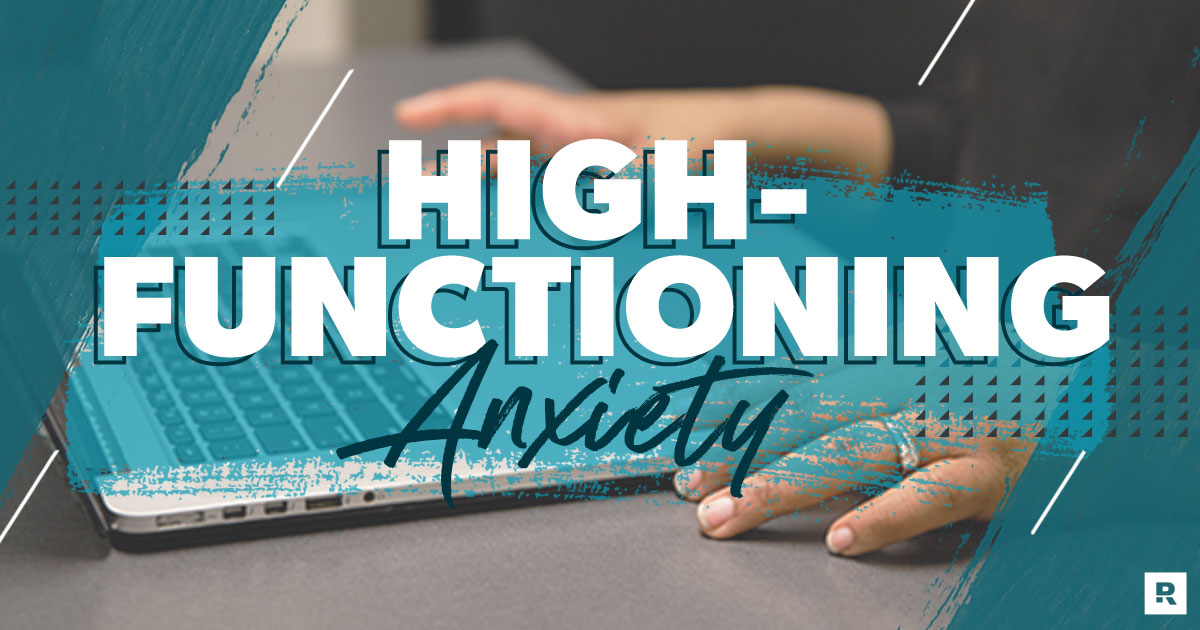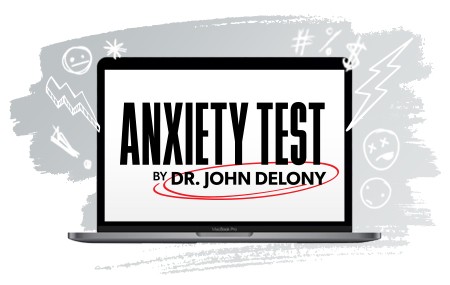
Key Takeaways
- High-functioning anxiety isn’t a medical diagnosis—it’s when life looks great on the outside, but you feel overwhelmed on the inside.
- Anxiety is your body’s way of sounding the alarm that something’s off—like when you’re feeling disconnected, unsafe or out of control.
- Healing starts when you stop identifying with anxiety, listen to your body, and take honest inventory of your life.
- Real peace comes from building healthy rhythms, saying no to chaos, and finding connection and community.
Maybe you feel like you have it all together. You’ve got the house, the kids, a killer gym routine, and a new promotion at work. Or maybe you’re three hours deep into an Instagram doom scroll and think your life should look the same way as these curated accounts. Either way, you wonder, Can anyone tell I’m absolutely exhausted?
Get expert money advice to reach your money goals faster!
Maybe you feel this right now—that everything looks right, and yet something on the inside is falling apart. And the perfectly detailed SUV in the driveway, luxury manicure appointments and glittering Little League trophies aren’t doing a darn thing to get rid of the feeling that you’re drowning in anxiety. You’d never know it, but this happens to a lot more people than you think. When things look perfect on the outside, but you feel like everything is falling apart on the inside, it could be what the nerds call high-functioning anxiety.
In many cases, someone with high-functioning anxiety has an anxious mind that’s working exactly as it should. Even though everything looks fine and you’re showing all the external markers of success, something in life is off—and your brain knows it. Anxiety is simply an alarm, and your promotion at work, designer shoes and honor roll bumper sticker won’t fix your loneliness or give you safety. Let’s explore this label and understand what people mean by it.
What Is High-Functioning Anxiety?
Anxiety is not a disease. High-functioning anxiety is not a medical condition, diagnosis or identity—it’s a pop psychology term that describes someone handling life while also feeling anxious. It’s a description of how you feel. High-functioning anxiety describes a real (but subjective) experience, but it’s not a real medical diagnosis. It’s difficult to know exactly how many people experience it. And that’s why I don’t like self-diagnoses—because your body is just trying to take care of you.
What Are Signs and Symptoms of High-Functioning Anxiety?
The symptoms of high-functioning anxiety look different for everyone. When someone claims to have high-functioning anxiety, it simply means they’re struggling with anxiety. Someone who feels they have high-functioning anxiety is often faced with a precarious situation: They’re unable to sleep or set boundaries. They’re always tired. They have a racing heart rate or excessive thoughts and worries. Their bodies are desperately trying to get their attention and let them know something is not well or right. But they’re crushing it at work, powering through checklists, climbing the ladder, falling in love, getting raises, and moving into homes with more square footage. From the outside, everything looks picture perfect.
But beneath that successful exterior, there’s an emotional and chemical storm brewing. So, we start responding to scary and stressful things by fighting them, running from them, or by freezing. Signs and symptoms of high-functioning anxiety include:
- Insomnia
- Not being able to relax and be present with others
- Feeling fatigued or being tired and wired
- Feeling impatient, reactive or ready to snap
- Experiencing physical pains, like headaches, stomachaches, muscle tension or shortness of breath
- Imagining worst-case scenarios, projected fears or ways things can go wrong
- Engaging in relationships through people pleasing, always being available, and never saying no
- Always needing more information, more data, another cup of coffee, another meeting, to ask another friend or another mentor instead of simply getting to work
- Using control or grit or strength to power your way into quieting the alarms instead of slowing down, stepping back, and healing
Your body will continue to work to get your attention. It will sound the alarms louder and louder until it shuts you down with a health crisis. Or you’ll start missing work because you can’t get out of bed. Or your marriage will fall apart. Or you’ll crash your Prius because you’re doing too many things at once.
I know because I’ve been there.
What Causes High-Functioning Anxiety?
As I mentioned earlier, anxiety is simply your body’s way of getting your attention and letting you know the storm clouds are gathering. Or that you need human connection. Or that you need to get out of here . . . now!
High-functioning anxiety is caused by a cascade of hormones, neurotransmitters, neuromodulators and other chemicals that prepare you to address danger. High-functioning anxiety is another way of saying your body might respond to stressors by fighting or running. Fighting is a desperate grasp for control, like responding to minor annoyances with aggressive behavior. This can be exhausting, isolating and terrifying. Running is avoidance, and it can have a numbing effect (you might zero in on work and achievement instead of facing the issue).
I’m way oversimplifying here, but in most cases, the underlying anxiety in your daily life is simply your body trying to let you know you’re not safe in some way. Your brain has detected you’re:
- Out of sync or missing relationships. Whether it’s a tribe, a community, deep friendships, a team or a unit—whatever you want to call it—you’re missing it.
- Unsafe. You’re in a toxic relationship, being abused, up against a major deadline, or you have a make-or-break exam barreling toward you.
- Not in control of your life. Maybe you’re a young kid trapped in a prison of chaotic adult expectations and demands. You’re in a ton of debt, and the credit card company decides what you get to do tomorrow (not you). Or you’re bingeing graphic news and clickbait stories and feeling out of control because of the state of the world.
Free Anxiety Test
This test will help you get clarity on the situations that could be contributing to your feelings of stress, anxiety and burnout.
What Are Positive Aspects of High-Functioning Anxiety?
High-functioning anxiety presents a few positive traits, which is why it can be hard to detect. People who identify with high-functioning anxiety are often:
- Highly effective at work
- Getting promoted
- Planning their next goal
- Very organized
- Detail oriented
- Outgoing and friendly
- Proactive and take initiative
- Punctual
- Helpful
- Calm, cool and collected (at least on the outside)
- Busy
What Are Negative Characteristics of High-Functioning Anxiety?
Everyone occasionally experiences the traits I’m about to mention. That’s the price to pay for being a human living on a spinning hunk of rock in space. But for some, the negative characteristics of high-functioning anxiety are a way of being. People who identify with high-functioning anxiety often:
- Feel shame or are afraid to be vulnerable
- Have perfectionistic tendencies
- Chatter nervously
- Overthink
- Need reassurance
- Procrastinate and then crunch to hit deadlines
- Dwell on the negative
- Criticize themselves and compare themselves to others
How to Treat High-Functioning Anxiety
When your life is affected by anxiety . . .
You’re tired. (And the caffeine isn't helping.)
You’re ready to breathe.
You deserve to laugh from your lungs. To poke fun at a friend and have them poke back at you. To go for a walk in the woods or hit the weights . . . hard. You deserve a full night of sleep without chemicals or incantations.
So, what do you do? The first place you start is by looking at the person in the mirror. You have to acknowledge and accept that anxiety is not your identity.
So, how do you treat high-functioning anxiety? There’s no quick fix, but with intentionality and the belief that you are worth being well, you can start making decisions that create a life free of anxiety. Here are a few ways to get started.
1. Stop using anxiety as an identity.
You feel anxious. You are not broken. Remember that you are a whole human with hobbies, friends, skills and dreams. The world would not be better off if you were not here. The anxiety is simply a message to pay attention to.
2. Honor the alarms.
Listen to what your body is telling you and when. If you feel your palms start to sweat when you see a certain coworker down the hall, maybe it’s time you have an uncomfortable conversation to clear the air. If you shake uncontrollably after you drink your fourth cup of coffee, it’s time to hear the message to cut back to a cup or two a day . . . and that’s after you eat some eggs and bacon. (For more clarity on the situations and circumstances that could be causing your feelings of anxiety and stress, take my free anxiety test.)
3. Take inventory of your life.
Living free of anxiety means you need to own and be honest about your life and the root of your anxiety. And you need to be ruthlessly honest that another pair of designer shoes or this year’s model of SUV or climbing yet another rung on the corporate ladder is not going to make it all better. Creating a life without anxiety often means you’ll need to learn one of the most powerful words in the known universe: no. Use it often, and use it well.
4. Make lifestyle changes and seek community.
No one can be well in isolation. We need community to heal. This isn’t woo-woo. This is neuroscience. Humans need community. There’s no long-term wellness or behavior change without others. Meet your neighbors. Go to church. Have a cup of coffee with your coworker. Healing your life means making different decisions and including others in the process. And if you need more support, I encourage you to find a counselor or therapist to walk alongside you.
Our culture has turned anxiety into something it’s not and made it sound scary with big, fancy labels like “high-functioning.” But it’s not who you are. I explain more about feelings of stress and anxiety in my new book, Building a Non-Anxious Life. If you or a loved one are facing feelings of anxiety, start reading to learn practical steps to begin living a life with more peace and joy.
And hey, I’m proud of you for being here. You’re worth being well.




